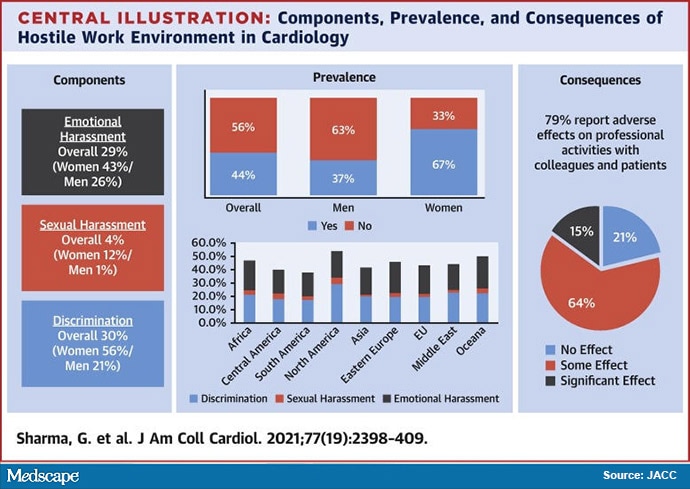In a survey of cardiologists from around the world, 44% of respondents reported experiencing a hostile work environment at some point in their careers.
A key finding was that of those who reported a hostile work environment, 62% said it had some effect and 13% said it had a significant impact on their professional activities with colleagues.
Almost half of those who reported such an environment, 46%, said the behavior affected patient care.
"Perceived emotional harassment or discrimination — and it may be small micro-invalidations, microaggression against women or people of color, or it could even by these little insults like being interrupted constantly or not introduced as a doctor — these things are very damaging and impact not just professional advancement and satisfaction, but they can also impact patient care," said lead author Garima Sharma, MD, from Johns Hopkins University School of Medicine, Baltimore, Maryland.
Higher rates of reported hostile work environment (HWE) were found among women cardiologists (68% vs 37% for men), Black cardiologists (53% vs 43% for Whites), and North American cardiologists (54% vs 38% for South Americans).
As part of an American College of Cardiology effort to better understand the workplace experienced by their 54,000+ members and beyond, an anonymous online survey was sent to 71,022 cardiologists, of whom 8% or 5931 (77% men; 23% women) responded.
The results were published in the May 18 issue of the Journal of the American College of Cardiology.
Both ACC members and non-members listed in the ACC database were eligible for participation. Medical students and nonphysicians were excluded.

"This is really just scratching the surface, but I think it's important to note that no other subspecialty in medicine has been able to do a survey like this at this scale," said Sharma.
Emotional harassment was reported by 29% of respondents (43% of women vs 26% of men). Sexual harassment was reported by 4% overall (12% of women and 1% of men).
Discrimination in some form was reported by 30% overall, 56% of women and 21% of men. Gender was the most frequent cause of discrimination (44%), followed by age (37%), race (24%), religion (15%), and sexual orientation (5%).
In this 50-item online survey conducted by the American College of Cardiology, HWE was defined as emotional harassment, discrimination, or sexual harassment.
In an interview with theheart.org | Medscape Cardiology, Sharma readily acknowledged that their survey was designed with a North American lens.
"What someone might find offensive or inappropriate is so variable and cultural, but I think the larger message here is that 44% of respondents felt harassment of some kind — whether it was sexual, emotional, based on age or gender or sexual orientation, or something else — that hindered their ability to practice medicine."
On multivariate analysis, women had the highest odds of experiencing HWE (OR, 3.39; P < .001) as were cardiologists early in their career (OR, 1.27; P < .001).
Javed Butler, MD, MPH, MBA, University of Mississippi Medical Center, Jackson, Mississippi, and Ileana L. Piña, MD, Central Michigan University, Midlands, Michigan, authored an editorial comment published alongside the paper. They called the results "disturbing, to say the least."
They noted some concern regarding the low response rate and the possibility of "responder bias," but ultimately decided that "even if one were to assume that most of the cardiologists who did not respond to the survey actually felt that hostile work environment is not an issue, this is not a reason to ignore the results of this survey and not address the concern of the individuals who did."
Regardless, strong action is needed. "For egregious infractions, there should be a zero-tolerance policy," they write, with "strict legal and human resource interventions" used as a deterrent against, for example, forced sexual behavior and reviews of complaints by "nonconflicted, diverse third parties" to calm fears of internal ramifications.
Important to understand better, they write, is whether this is an issue in some way more pertinent to the cardiology world, or more generalized to the medical field?
Sharma feels that cardiology may be a more hostile environment to women and minorities than some other subspecialties. "While the face of medicine is more diverse, cardiology is still predominantly a field of White men, which is partly why the ACC is working so hard to better understand these issues and affect change," said Sharma.
"We've moved the needle somewhat, but women are still only 21% of the cardiology workforce, while, for example, 50% of internal medicine graduates are women. In cardiology, it's still a leaky pipeline where women just get worn out from the discrimination and harassment and hostility, and it's perceived by trainees as being a really difficult subspecialty for women."
The authors have disclosed no relevant financial relationships.
J Am Coll Cardiol. Published in the May 18, 2021 edition. Abstract, Editorial
For more from theheart.org | Medscape Cardiology, join us on Twitter and Facebook
The Link LonkMay 15, 2021 at 04:37AM
https://ift.tt/3bnrfAb
ACC Survey: 44% of Cardiologists Report a Hostile Work Environment - Medscape
https://ift.tt/2VuKK1x
Work

No comments:
Post a Comment